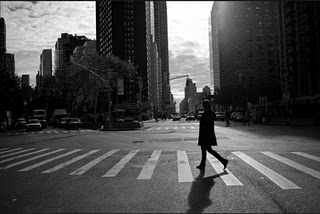

The famed poet, Rock musician and memoirist Patti Smith told a graduating class at Pace University in New York City that if she had to tell students one thing about the creative life it would be to get good dental care. She said in her day ( She is 64), artist were pretty poor and they let their teeth go. She went on to say that you want to pace back and forth in your garret because you are in close contact with your muse, not because you need a root canal.
One thing I would add that is a necessity for a poet or writer is walking. I’ve written about it before. You know the old slogan ” I ‘d walk a mile for a Camel.” Well, I’d walk 10 miles for the hell of it. In a recent article in the American Poetry Journal poet Ed Hirsch explains very nicely why walking is the right stimulant to get the creative juices flowing:
” Poetry is a vocation. It is not a career but a vocation. I have associated that calling with my life’s work, with walking. I love the leisurely pace amplitude, the spaciousness of taking a walk, of heading anywhere, somewhere on foot. You cross a threshold, and you’re on your way….Poetry is written from the body and mind, and the rhythm and the pace of a walk gets you going and grounded. It’s kind of a light meditation.. Day dreaming is one of the key sources of poetry–a poem often starts as a daydream that finds it way into language–and walking seems to bring a different sort of alertness, an associative kind of thinking, a drifting state of mind.”
If you have one book to read I would try Alfred Kazin’s “A Walker in the City.” Kazin remembered the walks he took as a child, and captures his neighborhood of Brownsville, Brooklyn–the dark and dank tenements where immigrant Jews from Russia and Poland lived lives of cramped desperation in the Depression Era. His walks lead him past the mysterious Irish and Italian neighborhoods, and even the enigmatic horizon of Manhattan, a veritable Emerald City for this provincial boy. By reading this book, and walking Kazin’s walk, you will learn what it takes to be a writer–a close observer. You will the read streets like you are reading a text–with a discerning eye for details, and for what’s behind the surface of things–a critical reader, indeed.
Walking through Boston and Somerville is like walking through different phases of my life. And with each walk I take I am flooded with images and memories that enter my writing. Walking down Bay State Rd. through Boston University I can recall stumbling home to my Brownstone dorm from some keg party at Shelton Hall across the street. I was told F. Scott Fitzgerald had a room in Shelton when it was a hotel. I could imagine the great writer sleeping off yet another bender in a room that was now occupied by some kid pulling an all-nighter. Walking further down into the campus and hitting the Nickerson Field football stadium I suddenly remember the streakers who traversed the field in their birthday suits on a chilly fall day. I never had the body for that.
I might find myself walking on the streets of Chinatown, looking for the drooping, fat-sweating ducks in the window of my favorite long defunct haunt the “Ying-Ying.” All those pungent smells, the chattering Cantonese of the customers, the mass produced wisdom of the fortune cookie–all those ghosts that walk by me on my walk.
And if I find myself in Somerville, and I am walking up Ibbetson Street;I might come across that orange colored Victorian that first housed my independent press Ibbetson Street. This was the first apartment my wife and I lived in when we were married. I remember the day we took a photograph of 30 poets sitting on our front porch, old hippies, Hip-Hoppers, graybearded leftists from the New York City East Village scene , young women with peasent skirts and long flowing hair blowing in the fragrant spring breeze. I remember the bemused gaze of the neighbors when we posed for that shot.
So if you have writer’s block, grab your coat, grab your hat, leave your troubles at the doorstep, just relax your feet on the sunnyside or even the darkside of the street, and that pensive pen will hit the blank sheet yet again.















Reader Comments